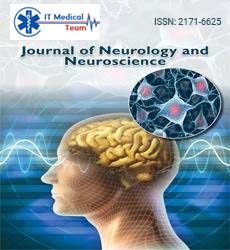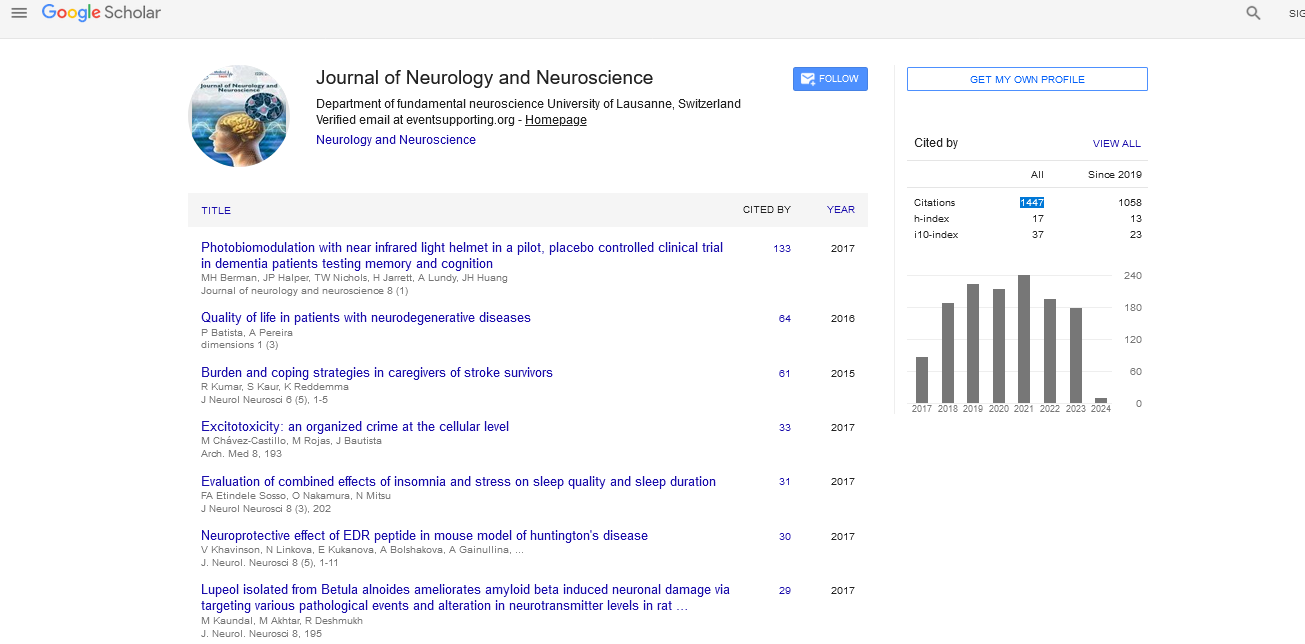Commentary - (2024) Volume 0, Issue 0
The Trauma from Unspoken Out-of-Body Experiences during Childhood
Marina Weiler*
Department of Psychiatry and Neurobehavioral Sciences, University of Virginia Health System, Charlottesville, USA
*Correspondence:
Marina Weiler, Department of Psychiatry and Neurobehavioral Sciences, University of Virginia Health System,
Charlottesville,
USA,
Email:
Received: 12-Aug-2024, Manuscript No. IPJNN-24-15147;
Editor assigned: 14-Aug-2024, Pre QC No. IPJNN-24-15147 (PQ);
Reviewed: 28-Aug-2024, QC No. IPJNN-24-15147;
Revised: 04-Sep-2024, Manuscript No. IPJNN-24-15147 (R);
Published:
11-Sep-2024, DOI: 10.4172/2171-6625.15.S10.005
Description
Out-of-Body Experiences (OBEs) have long captivated the
interest of researchers and the general public alike, often
described as moments in which individuals perceive themselves
as being detached from their physical bodies [1]. While much of
the discourse surrounding OBEs focuses on their metaphysical
implications or their thrill as a unique psychological phenomenon,
my research over the years has unveiled a more troubling aspect:
The potential for these experiences to be frightening and even
traumatizing. This complexity is particularly pronounced in
individuals who encounter OBEs during childhood, where the lack
of interpretive frameworks can leave lasting emotional scars.
Recently, I discovered that my 8-year-old son has been
experiencing several sleep-related phenomena, including OBE and
sleep paralysis, which may explain his challenging behavior at
bedtime. Although he is a healthy, happy, and fearless child, he
struggles with a deep fear of sleeping alone, often leading to a
nightly battle to postpone bedtime. He frequently wakes in the
middle of the night, terrified and seeks comfort by coming to my
room. Despite my chronic fatigue and irritation from being
awakened, I strive to reassure him, either guiding him back to his
bed or occasionally allowing him to sleep with me. I initially
attributed his frequent awakenings to nightmares, though I
sensed that such extreme fear might stem from a deeper issue
beyond typical childhood fears.
Through my recent research, I have engaged with numerous
individuals who reported having OBEs during their childhood,
often without understanding the phenomenon at the time. It
was only years later, in adulthood, that they were able to
articulate and label these profound experiences. During my
interviews, many participants reported feelings of helplessness
associated with their childhood OBEs. Some interpreted their
OBEs at the time as abductions or two beings wanting to take
them from their parents (one interviewee mentioned asking her
dad to build a fence around her bed to hold onto it ‘when she
was leaving’ to prevent being ‘taken.’) Many reported being
scared to share the experience with others due to not knowing
how to interpret what was happening, or fearing that something
was wrong with them. As a result, some individuals continued to
carry a burden of unresolved fear, significantly impacting their
overall psychological well-being.
OBEs are, most of the time, remarkable events and, even for
an adult, they are difficult to make sense of. The phenomenon of
ego dissolution that occurs during an OBE, well-known in
research with psychedelic compounds, often generates profound
psychological impacts, requiring cognitive accommodation and
often a reorganization of our interpretation of the world [2-4].
Not infrequently, adults who experience an OBE come to believe
in life after death, as they experience the sensation of existence
outside of a physical body.
This sensation is challenging to grasp, given that our notion of
existence is intrinsically and constantly linked to our bodily
sensations. Our physical bodies are essential to how we see
ourselves and how others see us; they are fundamental to our
identities [5]. We simply don't know what it's like to exist without
a physical body, at least until we have an OBE. Parenthetically,
another phenomenon that can happen at bedtime, often related
to OBEs, is sleep paralysis [1,6]. Sleep paralysis occurs during sleep
onset or offset when voluntary muscle movement is inhibited, yet
ocular movements remain intact [7]. During this time, the person
is fully conscious and aware of their surroundings. Although it
usually lasts only a few minutes, it can be very frightening and
often produces negative emotions such as anxiety [8,9].
Now imagine a child, who is still forming their notion of the
world and embodiment, having this type of experience during
the night; OBEs can be a source of confusion, fear and anxiety.
The disorienting and sometimes unsettling nature of these
experiences can be overwhelming for young individuals who may
not have the cognitive and emotional maturity to process them
effectively. Without proper guidance and support, children may
struggle to make sense of their OBEs, potentially leading to
feelings of isolation, vulnerability, or even a distorted sense of 3
reality. Unfortunately, as my interviews showed, these experiences
are not usually shared with parents, who may also be unaware of
this type of phenomenon.
The idea to ask my son if he was having any scary experiences
during night time only occurred to me after many conversations
with individuals who had OBEs during their childhood and they
shared with me the trauma these experiences had caused them.
‘Have you ever woken up with the feeling that you couldn’t
move your body?’ With wide eyes, my son answered ‘Yes.’ He
described how terrifying it was not being able to move his arms
and legs, even when ‘his brain was sending signals for them to move.’ Next, I asked, ‘And have you ever woken up at night with
the feeling that you were flying or floating in your room?’ Again,
with wide eyes, he answered affirmatively. Like him, I was also
surprised. He described the sensation of a wave of electricity
coursing through his body, and then he found himself floating
just above his physical body.
He detailed the position in which he saw his sleeping body, all the
impressions he had of the room, and said the experience seemed
very real as if he had woken up-a ‘classic’ OBE, as researchers would
informally call it. Talking through his experience, I told him that these
experiences were relatively common and invited him to share them
with me if they happened again. At that moment, I observed a
palpable sense of relief wash over him. The once daunting
experience now appeared to have lost much of its terrors, likely
a result of our open discussion and exchange of perspectives.
It was evident that the dialogue we had shared had played a
pivotal role in assuaging his concerns and reframing his perception of
his experiences. While it is too early to assess the long-term impact
of our recent conversations on my son’s ability to navigate his
experiences, existing research underscores the critical role of parentchild
communication regarding potentially traumatic events. Studies
indicate that such dialogues generally foster a child’s emotional wellbeing
and contribute to the development of a robust ‘emotional selfconcept’
[10,11].
Conversely, a lack of engagement in discussions about negative
emotional experiences can leave children’s memories vulnerable,
particularly concerning trauma, leading to less coherent narrative
formations [12,13].
References
- Weiler M, Moreira-Almeida A, Monti M (2024) Distinguishing out-of-body experiences from lucid dreaming: A phenomenological analysis. OSF.
[Crossref]
- Weiler M, Acunzo DJ, Cozzolino PJ, Greyson B (2024) Exploring the transformative potential of out-of-body experiences: A pathway to enhanced empathy. Neurosci Biobehav Rev 163:105764.
[Crossref] [Google Scholar] [PubMed]
- Buchborn T, Kettner HS, Kärtner L, Meinhardt MW (2023) The ego in psychedelic drug action-ego defenses, ego boundaries and the therapeutic role of regression. Front Neurosci 17:1232459.
[Crossref] [Google Scholar] [PubMed]
- Shaw J, Gandy S, Stumbrys T (2023) Transformative effects of spontaneous out of body experiences in healthy individuals: An interpretative phenomenological analysis. Psychol Conscious: Theory Res Pract 10:70-75.
[Crossref] [Google Scholar]
- Chen JY (2014) Human identity and identification. Yale J Biol Med 87:93-94.
[PubMed]
- Cheyne JA, Rueffer SD, Newby-Clark IR (1999) Hypnagogic and hypnopompic hallucinations during sleep paralysis: Neurological and cultural construction of the night-mare. Conscious Cogn 8:319-337.
[Crossref] [Google Scholar] [PubMed]
- Hobson JA, Pace-Schott EF, Stickgold R (2000) Dreaming and the brain: Toward a cognitive neuroscience of conscious states. Behav Brain Sci 23:793-842.
[Crossref] [Google Scholar] [PubMed]
- Fukuda K (2005) Emotions during sleep paralysis and dreaming. Sleep Biol Rhythms 3:166-168.
[Crossref] [Google Scholar]
- Herrero NL, Gallo FT, Gasca-Rolín M, Gleiser PM, Forcato C, et al. (2023) Spontaneous and induced out‐of‐body experiences during sleep paralysis: Emotions,“aura” recognition, and clinical implications. J Sleep Res 32:e13703.
[Crossref] [Google Scholar] [PubMed]
- Fivush R, Berlin LJ, McDermott SJ, Washburn JM, Cassidy J, et al. (2003) Functions of parent-child reminiscing about emotionally negative events. Memory 11:179-192.
[Crossref] [Google Scholar] [PubMed]
- De Boer EM (2020) Out of body, loss of self: Spiritual or scary? Religions 11:558.
[Crossref] [Google Scholar]
- Salmon K, Reese E (2015) Talking (or not talking) about the past: The influence of parent-child conversation about negative experiences on children's memories. Appl Cogn Psychol 29:791-801.
[Crossref] [Google Scholar]
- Sugarman A (2008) The use of play to promote insightfulness in the analysis of children suffering from cumulative trauma. Psychonanal Quart 77:799-833.
[Crossref] [Google Scholar]
Citation: Weiler M (2024) The Trauma from Unspoken Out-Of-Body Experiences during Childhood. J Neurol Neurosci Vol.15 No.S10:005.





